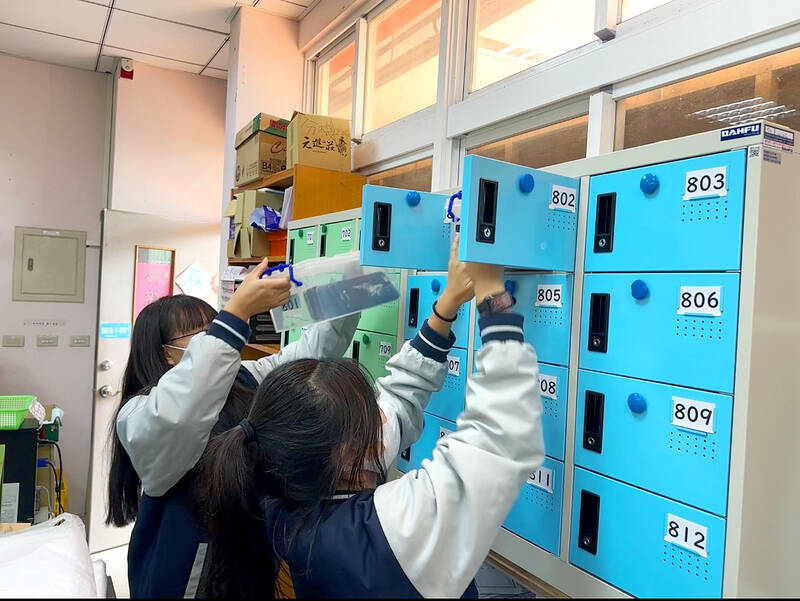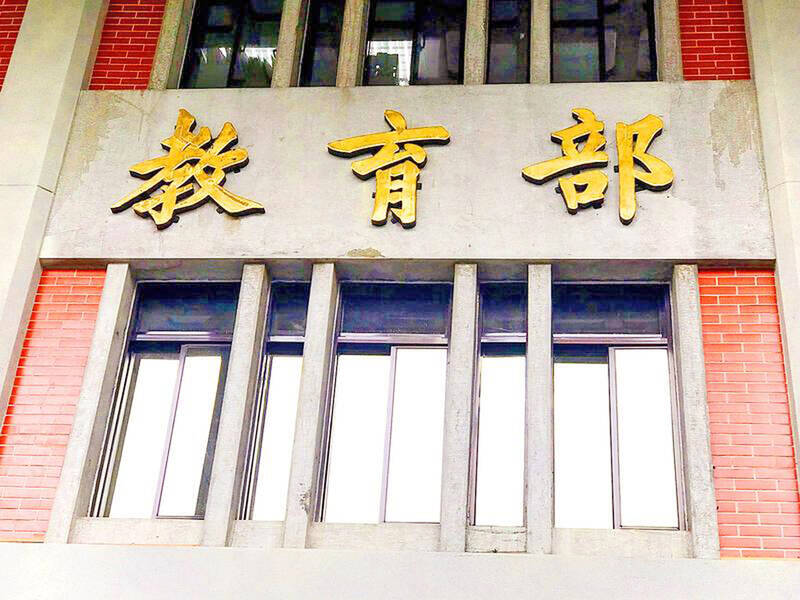The Ministry of Education yesterday said it plans to propose a regulation banning students’ use of mobile phones on campus except for learning or emergencies.
The legislature in October last year held a public hearing, in which mandatory regulations on smartphone use at schools were suggested, as teachers had difficulties managing students.
To deal with smartphone addiction among students, the ministry has convened an interagency meeting to discuss amendments to its Guidelines on the Use of Mobile Devices on Campus at Senior-High School Level or Below (高級中等以下學校校園行動載具使用原則), expecting to complete the draft before the spring semester.

Photo: Hung Mei-hsiu, Taipei Times
The ministry’s Department of Information and Technology Education official Tsai Wan-lin (蔡宛霖) said that guidelines promulgated in 2019 stipulate that mobile devices must be turned off at school except for learning under the teacher’s guidance or emergencies, and students should be prevented from engaging in activities irrelevant to learning with such devices.
As representatives at the interagency meeting suggested stricter management of mobile devices on campus, the ministry would continue to consult expert opinions and other countries’ policies to revise the guidelines, Deputy Minister of Education Chang Liao Wan-chien (張廖萬堅) said.
A possible solution is to allow confiscation and custody of students’ smartphones by schools, he added.

Photo: Rachel Lin, Taipei Times
Representatives of different groups would be invited to discuss them once the amendments are drafted, it said.
Democratic Progressive Party Legislator Fan Yun (范雲) cited a survey by the Ministry of Digital Affairs as saying that the severity of smartphone addiction among junior and senior-high school students is second only to that of college students.
As smartphone addiction can negatively affect learning, many countries, including the US and the UK, have promulgated regulations on students’ smartphone use, she said.
The Los Angeles Times has reported that California passed the Phone-Free Schools Act requiring high schools within the state to develop policies limiting or banning smartphone use during school hours by next year, with classroom lockers or magnetic pouches used to lock in students’ smartphones.
Meanwhile, EdYouth cofounder Lee Ruei-lin (李瑞霖) said today’s generation of students are digital natives born to live with smartphones, and they would find it intolerable to be banned from using the devices at school.
Lee cited a senior-high school student as saying that he would bring two phones to school, allowing the school to confiscate one phone while keeping another with himself.
Confiscation of smartphones is not an effective solution to digital addiction, he said, adding that the key lies in understanding students’ learning needs, enhancing the sense of meaning and guiding them to leverage digital tools in their learning journey.
A survey conducted by a student group suggested that most parents and teachers are supportive of restricting on-campus smartphone use, while half of junior-high school students and up to 90 percent of senior-high school students said they disagreed with the policy.
National Federation of Teachers’ Unions chairman Hou Chun-liang (侯俊良) said most teachers would support the ministry’s revision to the guidelines, as it would bolster students’ learning and class management.
However, feasible supplementary measures should also be established to address some students’ or parents’ special needs, and handle contravention of the rules, he said.
Smartphone addiction should be handled by employing counseling resources rather than mandatory rules, Hou added.

‘CORRECT IDENTIFICATION’: Beginning in May, Taiwanese married to Japanese can register their home country as Taiwan in their spouse’s family record, ‘Nikkei Asia’ said The government yesterday thanked Japan for revising rules that would allow Taiwanese nationals married to Japanese citizens to list their home country as “Taiwan” in the official family record database. At present, Taiwanese have to select “China.” Minister of Foreign Affairs Lin Chia-lung (林佳龍) said the new rule, set to be implemented in May, would now “correctly” identify Taiwanese in Japan and help protect their rights, the Ministry of Foreign Affairs said in a statement. The statement was released after Nikkei Asia reported the new policy earlier yesterday. The name and nationality of a non-Japanese person marrying a Japanese national is added to the

AT RISK: The council reiterated that people should seriously consider the necessity of visiting China, after Beijing passed 22 guidelines to punish ‘die-hard’ separatists The Mainland Affairs Council (MAC) has since Jan. 1 last year received 65 petitions regarding Taiwanese who were interrogated or detained in China, MAC Minister Chiu Chui-cheng (邱垂正) said yesterday. Fifty-two either went missing or had their personal freedoms restricted, with some put in criminal detention, while 13 were interrogated and temporarily detained, he said in a radio interview. On June 21 last year, China announced 22 guidelines to punish “die-hard Taiwanese independence separatists,” allowing Chinese courts to try people in absentia. The guidelines are uncivilized and inhumane, allowing Beijing to seize assets and issue the death penalty, with no regard for potential

‘UNITED FRONT’ FRONTS: Barring contact with Huaqiao and Jinan universities is needed to stop China targeting Taiwanese students, the education minister said Taiwan has blacklisted two Chinese universities from conducting academic exchange programs in the nation after reports that the institutes are arms of Beijing’s United Front Work Department, Minister of Education Cheng Ying-yao (鄭英耀) said in an exclusive interview with the Chinese-language Liberty Times (the Taipei Times’ sister paper) published yesterday. China’s Huaqiao University in Xiamen and Quanzhou, as well as Jinan University in Guangzhou, which have 600 and 1,500 Taiwanese on their rolls respectively, are under direct control of the Chinese government’s political warfare branch, Cheng said, citing reports by national security officials. A comprehensive ban on Taiwanese institutions collaborating or

STILL COMMITTED: The US opposes any forced change to the ‘status quo’ in the Strait, but also does not seek conflict, US Secretary of State Marco Rubio said US President Donald Trump’s administration released US$5.3 billion in previously frozen foreign aid, including US$870 million in security exemptions for programs in Taiwan, a list of exemptions reviewed by Reuters showed. Trump ordered a 90-day pause on foreign aid shortly after taking office on Jan. 20, halting funding for everything from programs that fight starvation and deadly diseases to providing shelters for millions of displaced people across the globe. US Secretary of State Marco Rubio, who has said that all foreign assistance must align with Trump’s “America First” priorities, issued waivers late last month on military aid to Israel and Egypt, the